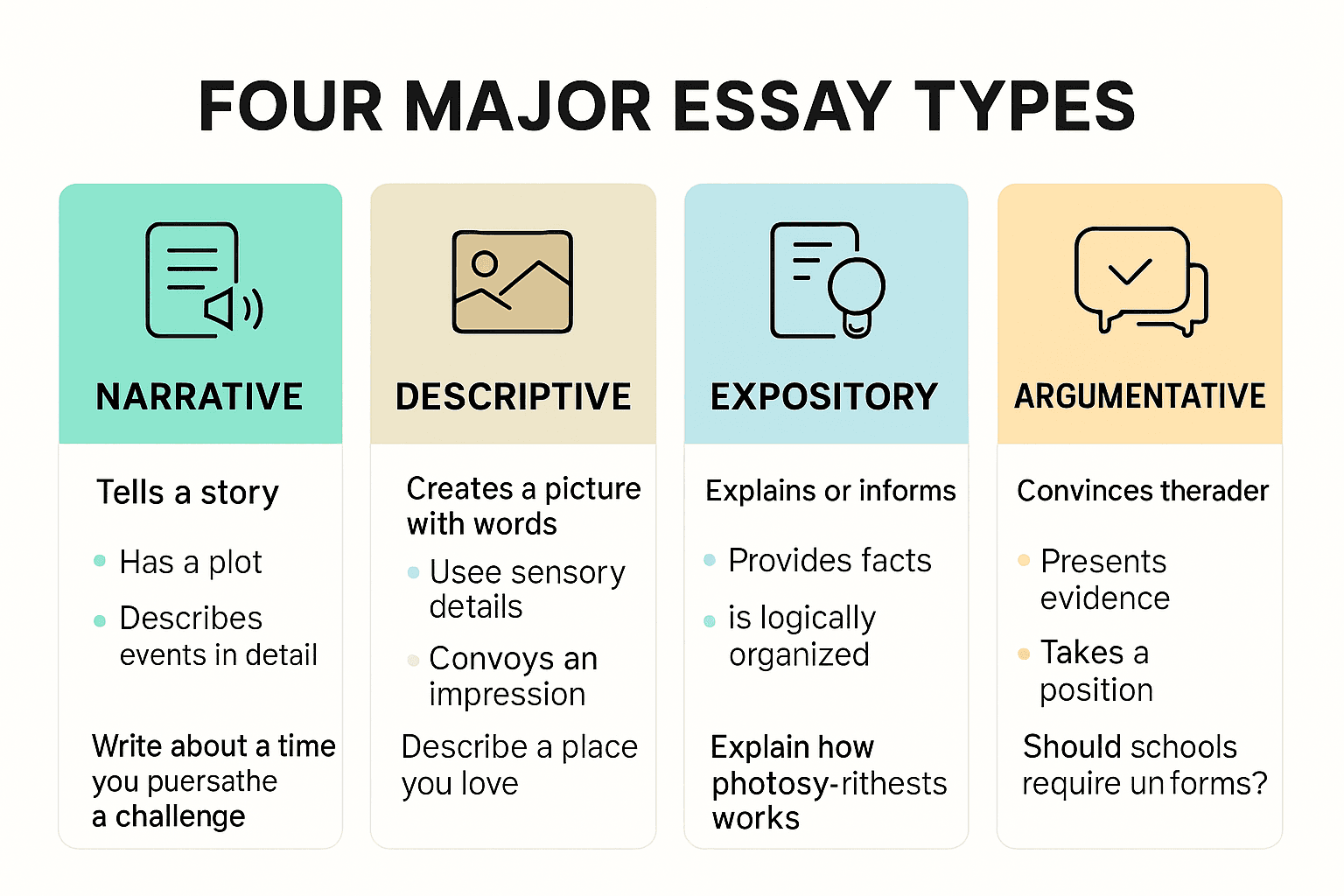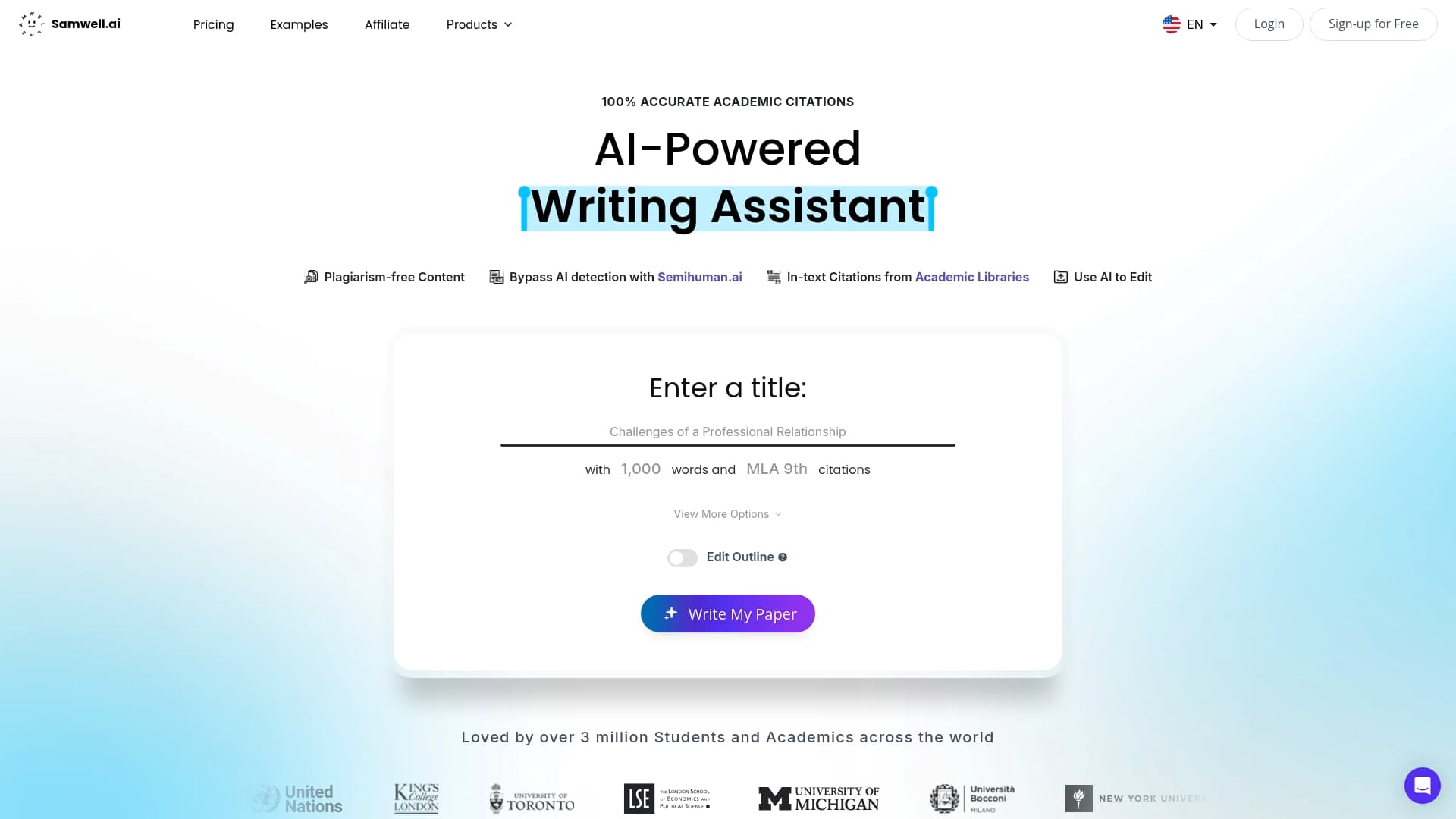Loading...

Every student and educator faces the challenge of choosing the right essay format for countless assignments. Surprisingly, fewer than half of college students can correctly identify the main essay types on their first try according to recent education surveys. It turns out that knowing the difference between narrative, descriptive, expository, and argumentative essays is what actually separates top academic performers from everyone else.
| Takeaway | Explanation |
|---|---|
| Understand essay types | Familiarize yourself with narrative, descriptive, expository, and argumentative essays. Each serves distinct academic purposes and requires different writing approaches. |
| Choose the right type | Select your essay type based on assignment guidelines and learning objectives to effectively demonstrate your knowledge and skills. |
| Follow a structured approach | Use a clear outline and organized method for drafting essays, enhancing the clarity and coherence of your arguments. |
| Develop a strong thesis | Create a concise, arguable thesis statement to guide your essay's structure and main argument effectively. |
| Refine writing techniques | Focus on formal language, accurate citations, and seamless evidence integration to elevate the quality of your academic writing. |
Writing an effective essay requires understanding the fundamental types of academic writing. Each essay type serves a unique purpose and demands specific approaches to research, analysis, and presentation. Students and educators must recognize these distinctions to craft compelling academic work.
Academic writing encompasses several primary essay types, each with distinct characteristics and objectives. Learn more about advanced essay techniques to elevate your academic writing skills.
According to the University of North Carolina Writing Center, the four primary essay types are:
To help you quickly compare and understand the four major essay types, the following table summarizes their key features and primary objectives.
| Essay Type | Main Purpose | Key Features |
|---|---|---|
| Narrative | Tell a personal or imaginative story | Personal experience, vivid details, emotional depth |
| Descriptive | Provide detailed descriptions | Sensory details, rich imagery, focused on people/objects |
| Expository | Explain or analyze a topic factually | Objective analysis, clear explanations, organized structure |
| Argumentative | Present and support a clear position | Defensible thesis, evidence, logical reasoning, rebuttals |
Each essay type requires a specific approach to content development and structure. Narrative essays invite personal storytelling, allowing writers to share experiences with vivid details and emotional depth. In contrast, expository essays demand objective analysis and clear explanations of complex topics.
Argumentative essays challenge writers to develop a strong thesis and support it with credible evidence. Writing Commons emphasizes the importance of logical reasoning and critical thinking in constructing persuasive arguments. These essays require students to:

Choosing the appropriate essay type depends on the assignment requirements, academic discipline, and specific learning objectives. Educators often assign different essay types to develop various academic skills. A narrative essay might assess creative writing abilities, while an argumentative essay evaluates critical thinking and research capabilities.
Students should carefully read assignment guidelines, understand the expected outcomes, and select an approach that best demonstrates their understanding of the subject matter. Flexibility and adaptability are key to mastering different essay types and becoming a versatile academic writer.
Successful essay writing requires a structured approach that transforms complex ideas into clear, coherent academic work. Explore our comprehensive essay outline strategy to streamline your writing process and improve academic performance.
The initial phase of essay writing demands careful preparation. According to the University of the Sunshine Coast, effective academic writing begins with thorough task analysis and strategic planning. Students must:
Portland State University's Writing Center emphasizes the critical importance of source evaluation and systematic research. Successful research involves:
Brown University's research guide highlights the iterative nature of academic writing. The drafting process requires careful attention to:
Each stage of essay writing demands specific skills and careful attention to detail. Students who approach their work methodically can transform complex research into powerful academic arguments. The key is to remain flexible, critically evaluate your work, and continuously refine your writing technique.
For clarity, here is a breakdown of the major stages of writing an academic essay, along with the key activities involved at each step as discussed in the article.
| Stage | Key Activities |
|---|---|
| Planning and Preparation | Understand the assignment, select a topic, conduct preliminary research |
| Research and Evidence | Identify sources, take notes, develop a thesis, organize research materials |
| Drafting and Refining | Create outline, write introduction/body/conclusion, integrate evidence, revise |
Mastering academic essay writing requires strategic skills and deliberate practice. Discover advanced academic writing techniques that can elevate your scholarly work to new heights.
According to the Harvard Writing Project, a strong thesis is the foundation of an exceptional academic essay. A well-crafted thesis should be:
Harvard Summer School emphasizes the importance of logical organization. Each paragraph should:
Gonzaga University's Political Science Department recommends several key strategies for academic writing excellence:

Successful academic writing is an art that combines rigorous research, clear thinking, and precise communication. Students who approach their essays with methodical preparation and attention to detail can transform complex ideas into compelling scholarly work. The key is continuous practice, critical self-evaluation, and a commitment to intellectual growth.
The main types of essays include narrative, descriptive, expository, and argumentative essays. Each type serves distinct academic purposes and requires different writing techniques.
To choose the right essay type, carefully read the assignment guidelines and consider the learning objectives. Select the type that best demonstrates your knowledge of the topic and fits the requirements.
A strong thesis statement should be specific, arguable, concise, and typically positioned at the end of the introduction. It serves as the foundation of your essay's argument.
To structure your essay effectively, create a detailed outline, ensure each paragraph presents a clear idea, use evidence to support your arguments, and connect your ideas logically throughout the essay.
Are you struggling to select the right essay type, craft a strong thesis, or structure your arguments effectively? The article highlights how understanding narrative, descriptive, expository, and argumentative essays can make a real difference in your academic results. Many students feel overwhelmed by research, citation rules, or the pressure to maintain originality. If any of these pain points sound familiar, you are not alone—and you do not have to solve them on your own.

Experience the future of academic writing at Samwell.ai. Our innovative AI-driven tools, like the Power Editor and Guided Essays, take you step by step from choosing the best essay structure to polishing your final draft. With built-in citation guidance and advanced originality checks, you gain peace of mind and more time to focus on learning. Curious how it works in practice? See how you can streamline your essay process now and join over one million students and educators already making their writing easier and more effective.



